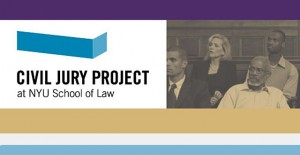Source of article DOAR Litigation Consulting.


Stephen Susman
In a series of articles on Law 360, Steve Susman, Richard Lorren Jolly and DOAR Jury Consultant Roy Futterman provide the Civil Jury Project’s proposed innovations for improved jury trials:
This is the third in our series of articles on the Civil Jury Project’s proposed innovations that can resuscitate the American jury trial. Each week we offer a summary of a different innovation, the legal support for its use, and empirical studies on its popularity. Each innovation has been proposed by academics and practitioners, implemented by state and federal judges, and is not prohibited in most jurisdictions. Most importantly, each innovation addresses the main criticisms leveled at juries — that they are too long, too expensive, too unpredictable — and are designed to make trial by civil jury a more desirable form of dispute resolution.
Innovation Three: Substantive Preliminary Instructions

Richard Lorren Jolly
One of the easiest ways to better civil jury trials is to give juries substantive instructions on the law at the beginning of the trial rather than at its conclusion. Such preliminary instructions resemble the final instructions and are not limited to things such as burden of proof, how to judge a witnesses’ credibility, or taking notes. These instructions aim to facilitate, first, a greater understanding by jurors of their duty in the decision-making process by providing them with a legal framework for assessing the parties’ arguments, and second, better decision-making.
Jurors take in information at trial in a convoluted fashion through witness testimony given in the unfamiliar and strange structure of a direct and cross-examination. They hear bits of information out of narrative order and must struggle to fit these pieces together into a logical story of the events of the case. In post-trial interviews, it is not uncommon for jurors to report that they did not really understand what exactly they would be asked to decide until after the jury instructions were given at the tail end after days or weeks of trial. By giving jurors preliminary instructions, the court provides jurors more context for what they are about to hear, so that they will be better able to understand, process, retain and prioritize information as it comes in.

Roy Futterman, Ph.D.
Substantive preliminary instructions are encouraged by legal organizations, and almost every jurisdiction permits them. For instance, Principle 6 of the American Bar Association’s Principles for Juries and Jury Trials suggests that “
Practitioners and judges tend to agree that these instructions are valuable. According to the New York State Trial Project, 92 percent of judges and 79 percent of attorneys thought that preliminary substantive instructions were helpful to jurors’ understanding of the law. Likewise, according to a national survey administered by the Civil Jury Project and the American Society of Trial Consultants, of the nearly 44 percent of responding attorneys that had experience with preliminary substantive instructions, just 2.2 percent did not recommend them. This makes it one of the most popular proposals that we are recommending.
Despite this strong support, the National Center of State Courts has found that just 19 percent of state and federal civil trials included preliminary instructions on the legal elements of the case. While the reasons for this disparity are unclear, we suspect that substantive instructions are absent because counsel and the court just get too busy with handling other things. There is so much to schedule in trial preparation that the relevant actors likely have little time to draft and debate even preliminary substantive instructions. This is especially true since at least some instructions on claims and defenses will prove unnecessary once dropped during the course of the trial.
Nevertheless, practitioners should confer and insist that the court provide the jury with substantive preliminary instructions. The limited time expense will only make the jurors more knowledgeable about the issues, and therefore better prepared to pay attention throughout the entire trial. As a result, the jury is more likely to reach an accurate outcome — something all parties presumably value.
Next week, we will address another easily implemented innovation that can better civil jury trials: Allowing jurors to ask witnesses questions.
Stephen D. Susman is a founder of Susman Godfrey LLP and the executive director for The Civil Jury Project at NYU School of Law.
Richard Loren Jolly is an attorney and research fellow at the Civil Jury Project.
Roy Futterman, Ph.D. is an adviser to the Civil Jury Project. He is a jury consultant, clinical psychologist and director at DOAR, Inc., as well as a columnist for Law360.
The post Innovating For Wise Juries: Preliminary Instructions appeared first on DOAR.
